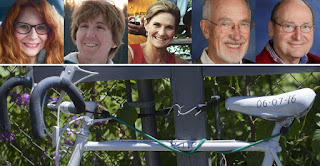Many of us envy countries like the Netherlands and Denmark, where people cycle even if they have other transportation or recreation options. Here in the US, we have "bicycle friendly" (a relative term, to be sure) islands in a motor-centric sea.
One reason for the difference between the cycling environments has to do with policies. Europeans seem to understand what it takes to make bicycling safe and practical enough for people to choose it over driving or other forms of transportation, at least for short trips. In America, on the other hand the notion of "bicycle friendliness" seems to consist of building bicycle lanes--which, as I've said in other posts, are too often poorly-conceived, -constructed and -maintained--and passing "safety" regulations that bear no relation to the experience of riding.
A reason for so much misguided policy, I believe, has to do with media coverage. I'm not familiar with what the Danes and Dutch print or broadcast, but I suspect that it's less auto-centric than what the French see and hear which, in turn, seems like tout l'Equipe compared to what we see on our pages and screens in America.
Now, some might say that I am in a "Big Apple Bubble." It's true that on many issues--including, ahem, gun rights (Guns have rights?)--most New Yorkers, including yours truly, think differently from a state legislator in Mississippi or Texas. But from what I've been seeing and hearing, New York City's news stories aren't the only ones infected with "windshield bias."
That apt phrase came to me from Christian MilNeil, a reporter on the Boston edition of Streetsblog. In his article, he describes how the city's broadcast news programs and newspapers have framed the debates in neighboring Cambridge over bike lanes and pedestrianizing public spaces. He noted something I've seen here in New York: the debates are too often framed as "bike lanes vs. parking spaces" or some other false equivalency, as in "we have more important issues, like gun violence and affordable housing."
I will not argue that gun violence and affordable housing are not urgent issues. But comparing issues is not useful. Moreover, how does making a park car-free prevent the construction of apartments and houses that people and families can afford on worker's wages? Or passing a law that would keep people who aren't old enough to drink or who have mental health issues from acquiring military-style assault weapons?
Speaking of which: A car, especially an SUV, is as deadly a weapon as an AR-15 when an unbalanced person is at the wheel. If policy-makers actually want to encourage more people to pedal or walk to work or school, they could take measures to prevent and more severely punish violence committed against cyclists and pedestrians in which the motor vehicle is the weapon.
But I digress. MilNeil's article shows that while coverage in Boston's print media has been somewhat more balanced, the city's television and other electronic media are heavily skewed toward organizations like "Save Mass Ave" who argue that building bike lanes will destroy their businesses. Too often, he points out, stories show only outraged owners of the businesses in question or give only a few seconds to a cycling or pedestrian advocate.
(For the record, the Cambridge City Council has consistently favored policies to build bike lanes and ban cars from parks and other public areas.)
 |
| Massachusetts Avenue in Cambridge. Photo from Boston Streetsblog. |
I suspect that some of that distortion is inevitable. For one thing, I'd guess that most reporters and editors aren't cyclists and probably don't often walk to get to wherever they're going. But there is a more important built-in bias, I think: As we've seen all too clearly during since Trump launched his first Presidential campaign, loud, angry voices are better than calm voices relating facts at "bringing the eyeballs to the screens" or keeping earbuds in ears.
Could it be that we need advocates who foam at the mouth the way some folks do when their right to have as many and whatever kind of guns--or parking spaces--as they want. Or to use them whenever, whenever they want.
